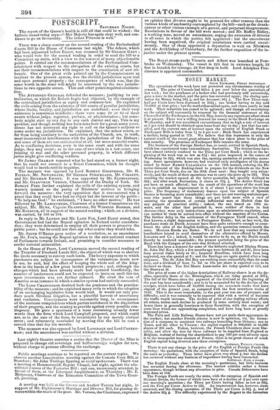POSTSCRIPT.
SATURDAY NIGHT.
The report of the Queen's health is still all that could be wished : the bulletin issued today says—" Her Majesty has again slept well, and con- tinues to go on favourably. The infant Princess is well."
There was a sharp contest on the second reading of the Ecclesiastical Courts Bill in the House of Commons last night. The debate, which had been adjourned before Easter, was resumed by Sir GEORGE GREY ; who would vote for the second reading in order to send the bill to a Committee up stairs, with a view to the removal of many objectionable points. It carried out the recommendations of the Ecclesiastical Com- missioners with respect to the abrogation of the existing courts, but not their recommendations with respect to the constitution of new tri- bunals. One of the great evils pointed out by the Commissioners as incident to the present system, was the divided jurisdiction upon real and upon personal property ; the consequence of which was, that the same words in the same will might be construed by the two jurisdic- tions in two opposite senses. This and other points required considera- tion.
The ATTORNEY-GENERAL defended the measure ; justifying its cen- tralization, to which Sir Robert Inglis had objected, by the example of the centralized jurisdiction at equity and common-law. He explained the evils arising from the existence of 380 courts of peculiar jurisdiction, whose limits, locality, and jurisdiction are undefined : even their very existence is sometimes indefinite : there were some 50 or 60 of these courts without judge, registrar, probate, or administration ; but some- body might start up any day in any such district and say, This is my peculiar, and though nothing has been done here for a great many years, disuse has not destroyed my right to call on the Queen's subjects to come under my jurisdiction. He explained, that the minor courts, so far from being auxiliary to the authorities of the Church, are, in truth, most inconvenient interferences with the jurisdictions of the Bishops ; and some of them are not ecclesiastical at all, but mere manorial courts. As to conflicting decisions, even in the same court and with the same judge, they may occur ; as in the case of two trials in a law-court, one relating to real and the other personal property, in which different juries might give conflicting verdicts.
Sir JAMES GRAHAM repeated what be had stated on a former night, that he could not consent to a Select Committee, which be thought would lead to inexhaustible inquiries.
The measure was opposed by Lord ROBERT GROSVENOR, Mr. H. FITZROY, Mr. NEWDEGATE, Sir GEORGE STRICKLAND, Mr. COLLETT, and Mr. RICKMAN EscoTT. It was supported by Mr. ELPHINSTONE, and Mr. GRANVILLE VERNON, Chancellor of the Duchy of York. Sir ROBERT PEEL further explained the evils of the existing system, and warmly insisted on the purity of Ministers' motives in bringing forward the measure : the very opposition that it encountered was a proof that they could have had no object but the interest of the public : "So help me God t " he exclaimed, " I have no other motive." He was followed by Mr. LABOUCHERE, Chairman of a former Committee on the subject, Mr. HUME, Captain GLADSTONE, Sir WINSTON BARRON, and Mr. ROEBUCK, all in support of the second reading ; which, on a division, was carried, by 186 to 104.
In reply to Mr. LEFROY and Mr. LANE Fox, Lord ELIOT stated, that Government had had the Repeal agitation in Ireland under considera- tion : they were determined to employ all their powers to preserve the public peace ; but he could not then say what course they would take.
Mr. &Jana O'BRIEN gave notice of a resolution, as an amendment on Mr. Fox's, tracing the Repeal agitation to the anti-national conduct of Parliament towards Ireland, and promising to consider measures to soothe national animosities.
In the House of Peers, Lord CAMPBELL moved the second reading of the Transfer of Freehold Lands Bill ; the object of which was to shorten the deeds necessary to convey such lands. The heavy expenses to which purchasers arc subject in consequence of the voluminous deeds now in use, he said, bad the effect of keeping the whole soil of the king- dom in the hands of a few great landed propietors ; and, although the changes which had been already made had operated beneficially, the number of landowners could not be expected to increase until this tax upon investments was yet farther reduced. He cited the case of America as an instance in which a similar system had entirely succeeded.
The LORD CHANCELLOR doubted both the prudence and the practica- bility of the measure ; and he explained many evils to which the adoption of an unchanging legislative form would lead. It would not only pro- duce much frivolous litigation, but a plentiful harvest of uncertainty and confusion. Conveyances were necessarily long, in consequence of the intricate complications which parties introduced in the disposition of their property, and the anxiety to provide against every possible con- tingency. He gave a specimen of a lease containing actually fewer words than the form which Lord Campbell proposed, and which could not, as in the case of the form, be invalidated by any merely clerical error ; and reluctantly concluded by moving that the bill be read a second time that day six months.
The measure was also opposed by Lord LANGDALE and Lord COTTEN- HAN ; and the amendment was carried without a division.


























 Previous page
Previous page